Se requiere una suscripción a JoVE para ver este contenido. Inicie sesión o comience su prueba gratuita.
Method Article
Medición de la morfología del tríceps sura sano y lesionado
En este artículo
Resumen
Las imágenes ecográficas son cada vez más accesibles en entornos clínicos y de investigación, y un protocolo coherente será beneficioso para la comparación entre estudios y para las interpretaciones clínicas. Este protocolo para la evaluación ecográfica es un método válido y fiable para evaluar la morfología del tendón de Aquiles en tendones sanos, tendinopáticos y rotos.
Resumen
Las lesiones del tendón de Aquiles se producen a lo largo de la vida y pueden afectar negativamente a la calidad de vida y a la salud en general. La tendinopatía de Aquiles generalmente se clasifica como una lesión por uso excesivo asociada con engrosamiento del tendón fusiforme, neovascularización y degeneración del tendón intersticial. La literatura actual sugiere que estos cambios estructurales se asocian con síntomas y niveles más bajos de actividad física, así como con síntomas y función de las extremidades inferiores a largo plazo. Las rupturas del tendón de Aquiles tratadas quirúrgicamente y no quirúrgicamente dan como resultado un aumento del área de la sección transversal del tendón (CSA) y un tendón de Aquiles alargado. Ambos resultados estructurales tienen implicaciones clínicas, ya que una mayor ASC predice positivamente la función, mientras que un mayor alargamiento del tendón predice una reducción de la función después de la ruptura del tendón de Aquiles. Dada la relación entre los cambios estructurales asociados con las lesiones del tendón de Aquiles tanto para la gravedad de la lesión como para la recuperación de la lesión, es fundamental poder cuantificar la estructura del tendón de Aquiles de manera confiable y precisa. El grupo de Silbernagel ha establecido un método válido y confiable para evaluar eficientemente la estructura del músculo tríceps sural y del tendón. En este protocolo, se utiliza la ecografía musculoesquelética en modo B para medir la estructura del tríceps sural, incluido el grosor del tendón de Aquiles y el CSA, el grosor del sóleo y la presencia de hallazgos adicionales (calcificaciones y bursitis). El campo de visión extendido en modo B se utiliza para medir la longitud del tendón de Aquiles y el CSA anatómico del gastrocnemio. Por último, el Doppler de potencia se utiliza para identificar la neovascularización intratendinosa. La cuantificación de la estructura del tríceps sural permite la comparación entre las extremidades, así como los cambios longitudinales en respuesta al ejercicio y al tratamiento para individuos sanos y aquellos con lesiones del tendón de Aquiles. Este protocolo se ha utilizado en muchos estudios de investigación hasta la fecha y resulta valioso para comprender la relación entre la estructura del tendón y el desarrollo, la gravedad y la recuperación de las lesiones. A medida que los dispositivos de ultrasonido son cada vez más asequibles y portátiles, este protocolo resulta prometedor como herramienta clínica, dados sus métodos rápidos y eficientes.
Introducción
El tendón de Aquiles se origina en las uniones miotendinosas de los músculos gastrocnemio y sóleo y se inserta en el calcáneo posterior. El tendón de Aquiles consiste principalmente en tejido de colágeno densamente empaquetado y organizado, dispuesto de manera jerárquica paramaximizar la resistencia a la tracción. A pesar de su capacidad para soportar grandes fuerzas, el tendón de Aquiles es susceptible a varios tipos de lesiones a lo largo de la vida. Estas lesiones, como la tendinopatía de Aquiles y las roturas del tendón de Aquiles, suelen ir acompañadas de cambios en la estructura del tríceps sural y los tejidos circundantes. En la tendinopatía de Aquiles, los pacientes a menudo exhiben engrosamiento del tendón fusiforme, tendinosis, desorganización del colágeno y neovascularización, un proceso de proliferación de tejido vascular y neural en el tendón2. Además, los cambios patológicos asociados a la tendinopatía de Aquiles incluyen paratendinitis, calcificaciones intratendinosas y/o entesales y bursitis 2,3. Después de las roturas del tendón de Aquiles, los cambios estructurales son comunes, independientemente del tratamiento, e incluyen el engrosamiento del tendón de Aquiles y el aumento de la longitud del tendón 4,5. Además, los cambios musculares, como la atrofia muscular del tríceps sural, también se asocian comúnmente con lesiones del tendón de Aquiles 5,6.
La capacidad de evaluar el tríceps sural y las estructuras tisulares circundantes proporciona información valiosa sobre la integridad estructural, la calidad y el tamaño del tejido, que se sabe que se relacionan con los síntomas, la función y el pronóstico 4,7,8,9. La ecografía es una herramienta de evaluación fiable y válida de estas estructuras, que incluye, entre otras, la longitud del tendón de Aquiles10, el grosor10,11, el área de la sección transversal (CSA)12, el CSA anatómico gastrocnemio13 y la neovascularización14,15. La evaluación de estas medidas proporciona información valiosa sobre la comprensión del tejido sano del tríceps sural, así como la cuantificación de las alteraciones estructurales para evaluar el riesgo de lesión, la gravedad y la recuperación, así como la comprensión de las cualidades del tejido sano16.
A pesar de la utilidad clínica y de investigación de la ecografía en la evaluación de la estructura del tríceps sural, a menudo existen diferencias en las técnicas de imagen y los parámetros de medición entre los estudios clínicos y de investigación17,18. Como resultado, las comparaciones entre estudios son difíciles. Por lo tanto, el propósito de este artículo es describir un protocolo válido y confiable para evaluar de manera eficiente la estructura muscular y tendinosa del tríceps sural mediante imágenes de ultrasonido musculoesquelético. Este protocolo tiene como objetivo demostrar la viabilidad de incorporar esta herramienta en entornos clínicos y de investigación en su totalidad o como partes específicas en individuos sanos y lesionados. Además, se proporcionan valores representativos de tríceps surales sanos y lesionados.
Protocolo
El siguiente protocolo sigue las pautas establecidas y ha sido aprobado por la Junta de Revisión Institucional de la Universidad para garantizar una investigación segura y ética con sujetos humanos. Todos los sujetos dieron su consentimiento informado para participar en los estudios de investigación y la difusión de datos. El protocolo completo tarda aproximadamente 20 minutos en ser realizado por un ecografista capacitado. Sin embargo, se pueden tomar medidas individuales según la necesidad de evaluación.
1. Marcado de la piel
- Pida al participante que se siente al final de un pedestal con las piernas colgando de la mesa.
- Palpar y marcar bilateralmente la meseta tibial medial y la cara más distal del maléolo medial. Mida la distancia entre las marcas ipsilaterales para determinar la longitud de la tibia.
- Calcula el 25% de la longitud de la tibia. Mida y marque esta distancia, distal de la meseta tibial medial, para indicar la ubicación de las mediciones de gastrocnemio (Figura 1).
- Calcula el 30% de la longitud de la tibia. Mida y marque esta distancia, proximal desde el aspecto más distal del maléolo medial, para indicar la ubicación de las mediciones del sóleo (Figura 1).
- Registre el 25% y el 30% de la longitud de la tibia para medir longitudinalmente la misma ubicación durante futuras evaluaciones.
- Pida al participante que se coloque en una posición prona sobre el pedestal con las rodillas completamente extendidas y los pies colgando relajados del borde del pedestal con los tobillos en posición de descanso (Figura 2).
- Transfiera las marcas de gastrocnemio y sóleo a la cara posterior de la parte inferior de la pierna. Palpar y marcar el punto medio del gastrocnemio (el punto más distal entre los dos vientres musculares). Pida al participante que haga una flexión plantar suavemente contra la resistencia manual para palpar este lugar.
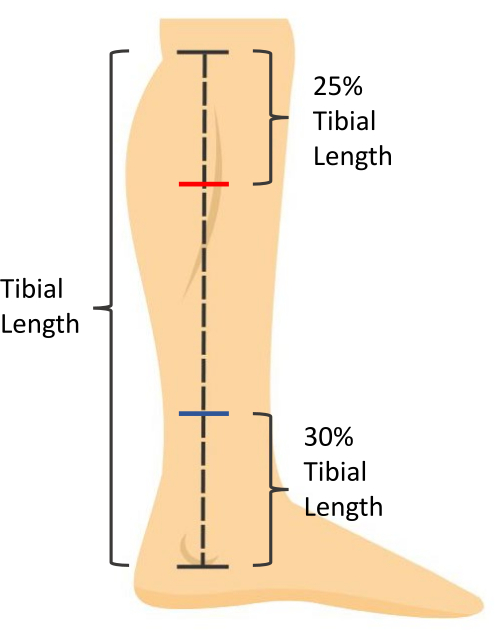
Figura 1: Marcas de medición de la piel. La longitud de la tibia se mide como la distancia desde la meseta tibial medial hasta la cara más distal del maléolo medial. El grosor del músculo sóleo se mide en el 30% de la longitud tibial proximal a la cara más distal del maléolo medial (marca azul). El músculo gastrocnemio CSA se mide en el 25% de la longitud tibial distal a la meseta tibial medial (marca roja). Haga clic aquí para ver una versión más grande de esta figura.
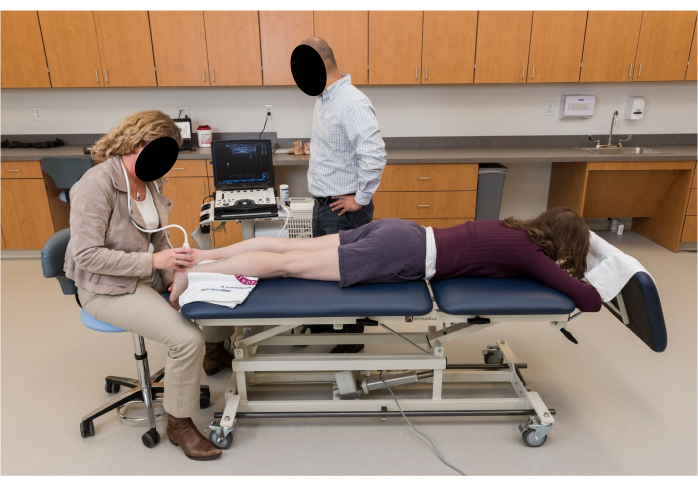
Figura 2: Posicionamiento de los participantes para la ecografía. El participante está boca abajo con las rodillas completamente extendidas y los pies colgando relajados en una posición de tobillo en reposo del borde del zócalo. Haga clic aquí para ver una versión más grande de esta figura.
2. Imágenes de ultrasonido
NOTA: Todas las imágenes se tomarán con ambas piernas. Todas las imágenes deben tomarse a lo largo de la línea media del tendón de Aquiles. Utilice la palpación de los bordes medial y lateral del tendón de Aquiles para determinar la ubicación de la línea media.
- Utilice ultrasonido en modo B con un transductor de matriz lineal de 5 cm con parámetros establecidos para la visualización del tríceps sural. Ajuste la frecuencia a 10 MHz y la profundidad de medición a 3,5 cm para la visualización. Ajuste los focos entre 0,75 cm y 1,75 cm con una ganancia ajustada a 49 para una visualización óptima del tejido.
NOTA: La profundidad, los focos y la ganancia se pueden ajustar según corresponda para la visualización. - Coloque gel de ultrasonido en el calcáneo posterior. Sosteniendo la sonda en el eje largo, visualice la muesca del calcáneo proximal y alinee la muesca con el punto medio de la sonda de ultrasonido. Marque esta ubicación en la piel (Figura 3).
- El marcado de la piel para la medición del grosor del tendón de Aquiles y el CSA variará según el participante. Utilice las siguientes pautas para determinar esta posición.
- Para individuos sanos, mida 2 cm proximal desde la escotadura calcánea proximal y marque esta ubicación en la piel.
- Para las personas con tendinopatía de Aquiles, visualice la porción más gruesa del tendón de Aquiles con la sonda de ultrasonido en el eje largo y marque esta ubicación en la piel. Registre la distancia de esta marca desde la escotadura del calcáneo proximal para medir longitudinalmente la misma ubicación durante futuras evaluaciones.
- Para las personas con tendinopatía de Aquiles sin engrosamiento fusiforme visible, marque la piel en el lugar de mayor dolor tendinoso a la palpación. Registre la distancia de esta marca desde la muesca calcánea proximal para medir longitudinalmente la misma ubicación durante futuras evaluaciones.
- Para las personas después de la rotura del tendón de Aquiles, visualice la ubicación de la ruptura con la sonda de ultrasonido en el eje largo y marque esta ubicación en la piel. Registre la distancia de esta marca desde la muesca calcánea proximal para medir longitudinalmente la misma ubicación durante futuras evaluaciones.
- Para la extremidad no afectada, haga la marca de la piel a la misma distancia de la escotadura calcánea proximal que la extremidad afectada.
- Longitud del tendón gastrocnemio (longitud completa del tendón): Utilizando un campo de visión extendido y sosteniendo la sonda en el eje largo, comience la imagen en el calcáneo visualizando la inserción del tendón de Aquiles. Deslice la sonda proximalmente a lo largo de la línea media del tendón de Aquiles hacia la marca en el punto medio del gastrocnemio hasta que se visualice la unión miotendinosa. Esto finalizará la imagen. Tome tres imágenes de la longitud completa del tendón de Aquiles (Figura 4).
- Longitud del tendón del sóleo (longitud libre del tendón): Utilizando un campo de visión extendido y sosteniendo la sonda en el eje largo, comience la imagen en el calcáneo visualizando la inserción del tendón de Aquiles. Deslice la sonda proximalmente a lo largo de la línea media del tendón de Aquiles hacia la marca en el sóleo hasta que se visualice la unión miotendinosa del sóleo. Tome tres imágenes de la longitud libre del tendón de Aquiles.
- Grosor del tendón de Aquiles: Utilizando la vista del modo B, coloque la sonda en el eje largo de la marca cutánea hecha para el grosor del tendón de Aquiles y la CSA (paso 2.3). Tome tres imágenes del grosor del tendón de Aquiles.
- Área de la sección transversal del tendón de Aquiles: Con la vista del modo B, coloque una almohadilla de separación de gel en la marca de la piel hecha para el grosor del tendón de Aquiles y la CSA (paso 2.3). Sosteniendo la sonda en el eje corto, tome tres imágenes de la sección transversal del tendón de Aquiles.
NOTA: El tendón es de calidad anisotrópica; dependiendo del ángulo de las ondas sonoras, se reflejará, haciendo que se vea brillante, o se reflejará, haciendo que se vea oscuro (Figura 5). Por lo tanto, alternar la sonda hacia adelante y hacia atrás ayudará a visualizar el borde del tendón. - Grosor del sóleo: Usando la vista en modo B, coloque la sonda en el eje largo de la marca de piel hecha para el sóleo (30% de la longitud tibial desde la cara distal del maléolo medial). Visualiza el borde anterior del músculo sóleo. Tome tres imágenes para el grosor del sóleo19.
- Para distinguir entre el sóleo y el flexor largo del dedo gordo, haga que el participante flexione y extienda activamente el dedo gordo del pie. Esto provocará el movimiento de las fibras del flexor largo del dedo gordo sin mover las fibras del sóleo.
- Área de la sección transversal del gastrocnemio: Utilizando un campo de visión ampliado, sostenga la sonda ecográfica en el eje corto y en línea con la marca del gastrocnemio (25% de la longitud tibial desde la meseta tibial medial). Visualice el borde medial del gastrocnemio medial y comience la imagen deslizando la sonda de medial a lateral hasta que se visualice el borde lateral del gastrocnemio lateral. Tome tres imágenes para el gastrocnemio CSA13.
- Para capturar el aspecto más medial del gastrocnemio medial, puede ser necesario pedirle al participante que abduca sus piernas y rota internamente la cadera ligeramente. Si esto es necesario, asegúrese de que el participante no esté flexionando el pie plantar, ya que esto afectará las mediciones.
- Utilizando la vista del modo B, determine la presencia o ausencia de calcificaciones dentro del tendón de Aquiles (Figura 6D) y/o en la inserción del tendón de Aquiles (entesis; Figura 6C). Estas calcificaciones se desprenden del calcáneo y aparecen como áreas hiperecogénicas con una sombra por debajo, presentes en múltiples planos de visión. Tome una imagen para confirmar los hallazgos. Observe si las calcificaciones ocurren dentro del tendón de Aquiles o en la entesis.
- Usando la vista del modo B, determine la presencia o ausencia de bursitis. Esto se visualiza mediante un área hipoecogénica profunda al tendón de Aquiles en el calcáneo proximal (bursitis retrocalcánea) y/o superficial a la inserción del tendón de Aquiles (bursitis subcutánea del calcáneo). Tome una imagen para confirmar los hallazgos (Figura 6B).
- Utilizando la configuración Doppler en la ecografía, evalúe la presencia o ausencia de neovascularización dentro del tendón de Aquiles.
- Coloque la caja Doppler (es decir, la región de interés) en el tendón, mantenga la sonda de ultrasonido quieta y evite presionar o distender el tejido, ya que esto puede ocluir e impedir la visualización del flujo sanguíneo.
- Escanee la longitud del tendón libre de Aquiles, asegurándose de evaluar cada porción del tendón sin mover la sonda para evitar artefactos. Si hay vasculatura visible dentro o en contacto con el tendón, tome videos de tres o 3 s en la región con el flujo sanguíneo máximo (Figura 6A).
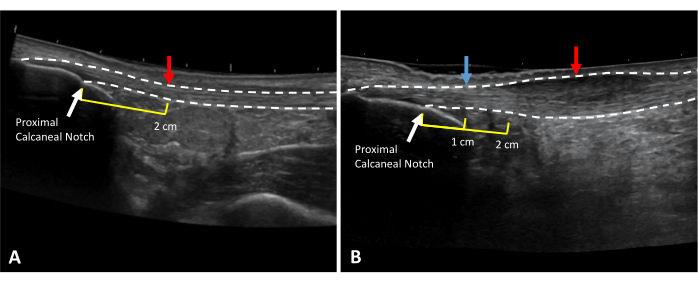
Figura 3: Espesor del tendón de Aquiles y ubicaciones de medición de CSA. Imágenes de ultrasonido de campo de visión extendido de (A) un tendón de Aquiles sano y (B) tendinopático. Las líneas punteadas indican los bordes de los tendones. Las flechas rojas indican las ubicaciones de medición. Las líneas amarillas indican la distancia proximal a la escotadura proximal del calcáneo (flecha blanca). En el caso de engrosamiento en la marca de 2 cm (B), el grosor saludable del tendón debe tomarse en un área saludable en el tendón libre (flecha azul). Haga clic aquí para ver una versión más grande de esta figura.
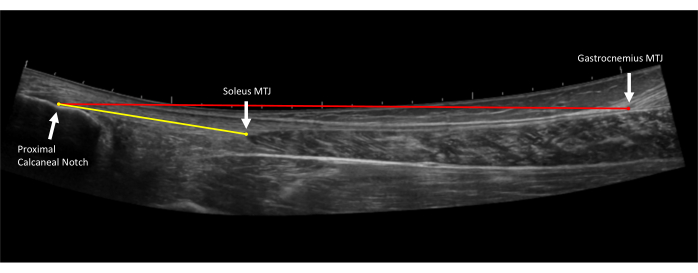
Figura 4: Mediciones de la longitud del tendón de Aquiles. Imagen ecográfica de campo de visión ampliado del tendón de Aquiles. La longitud del tendón libre (línea amarilla) se mide desde la inserción proximal del tendón de Aquiles en la escotadura del calcáneo proximal hasta la unión miotendinosa del sóleo (MTJ). Se mide la longitud completa del tendón (línea roja) desde la inserción del tendón de Aquiles proximal en la escotadura del calcáneo proximal hasta la unión miotendinosa gastrocnemia (MTJ)10. Haga clic aquí para ver una versión más grande de esta figura.
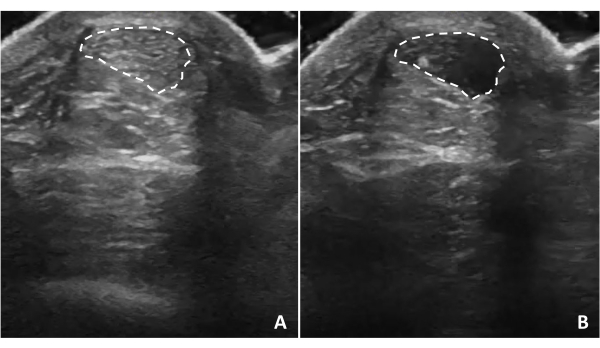
Figura 5: Anisotropía tendinosa. La anisotropía del tendón de Aquiles se produce cuando las ondas ultrasónicas no son perpendiculares a la estructura. La inclinación de la sonda de ultrasonido hará que la estructura del tendón parezca (A) hiperecogénica o (B) hipoecoica, dependiendo de la relación de las ondas de ultrasonido con el tendón. Las líneas punteadas indican los bordes de los tendones. Haga clic aquí para ver una versión más grande de esta figura.
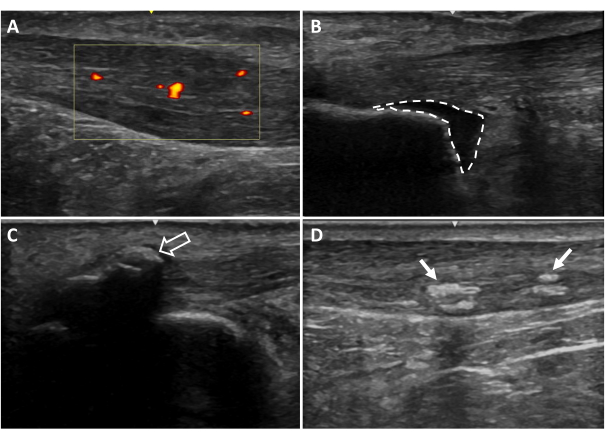
Figura 6: Hallazgos ecográficos adicionales. (A) Neovascularización, (B) bursitis retrocalcánea, (C) calcificaciones entesisales, (D) calcificaciones intratendinosas. Las áreas coloreadas en rojo y amarillo indican flujo sanguíneo dentro de la región del tendón de interés (cuadro amarillo). Las líneas punteadas indican los bordes de la bursa. Las flechas indican calcificaciones20. Haga clic aquí para ver una versión más grande de esta figura.
3. Mediciones ecográficas
NOTA: Las mediciones de ultrasonido se pueden realizar en la máquina en función de la configuración y las herramientas de la máquina de ultrasonido respectiva. Las imágenes también se pueden exportar para tomar medidas en software como el visor DICOM Osirix. Para el análisis se utilizará el promedio de los tres ensayos para cada medida.
- Longitud del tendón gastrocnemio (longitud completa del tendón): Abra la imagen del tendón con campo de visión extendido más larga (tomada en el paso 2.4). Mida desde el punto más proximal de la inserción del tendón (escotadura calcánea proximal) hasta la unión miotendinosa del gastrocnemio (Figura 4).
- Longitud del tendón del sóleo (longitud libre del tendón): Abra la imagen más corta del tendón con campo de visión extendido (tomada en el paso 2.5). Mida desde el punto más proximal de la inserción del tendón (escotadura calcánea proximal) hasta la unión miotendinosa del sóleo (Figura 4).
- Grosor del tendón a 2 cm: Abra la imagen del tendón con campo de visión extendido del disparador. Mida desde el punto más proximal de la inserción del tendón (escotadura calcánea proximal) hasta 2 cm, con el final de la medición en el borde profundo del tendón. Mida desde este punto en el borde profundo del tendón hasta el aspecto superficial directo del tendón para obtener el grosor del tendón de 2 cm. Esta medida debe representar un grosor saludable del tendón (Figura 7A).
- En el caso de la tendinopatía de Aquiles, si el tendón está engrosado a esta distancia de 2 cm, ubique un área sana en el tendón libre para tomar esta medida y documente la distancia desde la escotadura calcánea proximal (Figura 7B).
NOTA: El grosor se utiliza para describir el grosor bruto del tendón desde el más superficial hasta el más profundo.
- En el caso de la tendinopatía de Aquiles, si el tendón está engrosado a esta distancia de 2 cm, ubique un área sana en el tendón libre para tomar esta medida y documente la distancia desde la escotadura calcánea proximal (Figura 7B).
- Área de la sección transversal del tendón: Abra la imagen tomada en el paso 2.7. Identifique visualmente los bordes del tendón de Aquiles y delinee la circunferencia del tendón (Figura 8A).
- Grosor del tendón: Abrir imagen tomada en el paso 2.6. En el centro de la imagen, mida el tendón de Aquiles desde el borde superficial hasta el borde profundo del tendón (Figura 8B).
- Grosor del sóleo: Abrir imagen tomada en el paso 2.8. En el centro de la imagen, mida desde el borde superficial hasta el borde profundo del músculo sóleo (Figura 9).
- Área de la sección transversal del gastrocnemio: Abra la imagen tomada en el paso 2.9. Visualice los bordes de las cabezas medial y lateral del gastrocnemio y delinee la cabeza del gastrocnemio medial y luego las cabezas laterales del gastrocnemio (Figura 10).
- Engrosamiento del tendón de Aquiles: Utilice este cálculo para determinar el grado de engrosamiento del tendón en la tendinopatía de Aquiles. Reste el grosor a 2 cm (o ubicación ajustada; Figura 7A) a partir del grosor del tendón (Figura 7B) para obtener el engrosamiento del tendón (medición en el paso 3.5 menos medición en el paso 3.3).
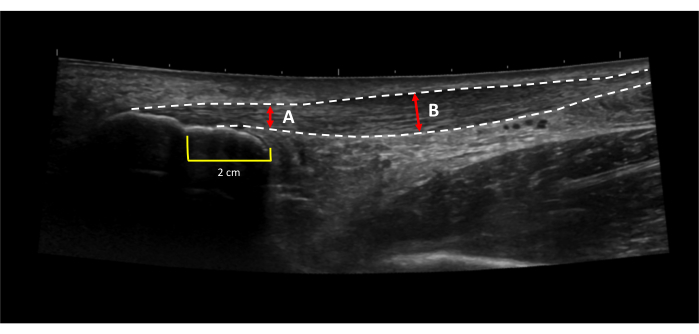
Figura 7: Engrosamiento del tendón de Aquiles. El engrosamiento del tendón de Aquiles se calcula restando (A) el grosor de la porción sana del tendón de (B) el grosor de la porción más gruesa del tendón31. Las líneas punteadas indican los bordes de los tendones. Las líneas rojas indican el grosor del tendón. Las líneas amarillas indicaban una distancia proximal de 2 cm a la escotadura proximal del calcáneo. Haga clic aquí para ver una versión más grande de esta figura.
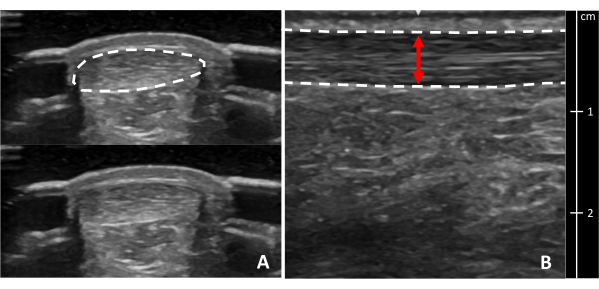
Figura 8: Área de la sección transversal del tendón de Aquiles y grosor. Imágenes de ultrasonido del tendón de Aquiles en (A) sección transversal y (B) vista longitudinal en la porción más gruesa. Las líneas punteadas indican los bordes de los tendones. La línea roja indica el grosor del tendón. Se muestra una sección transversal del tendón con y sin borde para mayor claridad. Haga clic aquí para ver una versión más grande de esta figura.
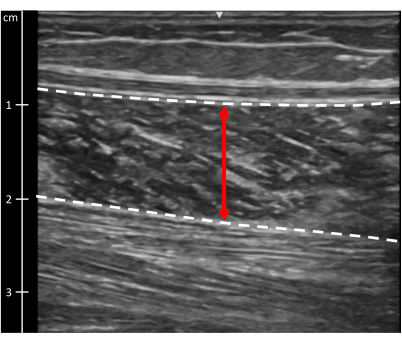
Figura 9: Grosor del músculo sóleo. Imagen ecográfica del músculo sóleo. Las líneas punteadas indican los bordes musculares. La línea roja indica el grosor del músculo. Haga clic aquí para ver una versión más grande de esta figura.
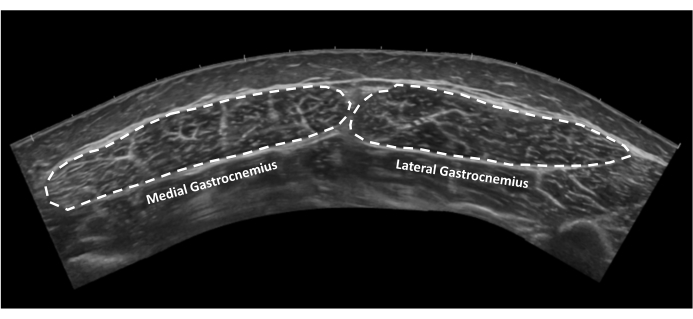
Figura 10: Área de la sección transversal del músculo gastrocnemio. Imagen ecográfica de campo de visión extendido de los músculos gastrocnemio medial y lateral en sección transversal. Las líneas punteadas indican los bordes de los tendones. Haga clic aquí para ver una versión más grande de esta figura.
Resultados
Las medidas de este protocolo han demostrado ser fiables y válidas 10,20. Se ha descrito una excelente fiabilidad para la longitud del tendón de Aquiles ampliada entre el tendón de Aquiles y el gastrocnemio (coeficiente de correlación interclase (ICC): 0,944) y la longitud del tendón de Aquiles con el sóleo (ICC: 0,898)10. El cambio mínimo detectable a nivel de grupo (grupo MDC) para las medidas de longitud del tendón de...
Discusión
Los pasos críticos en el protocolo para garantizar la validez y confiabilidad de los métodos incluyen el uso de marcas cutáneas en los participantes para guiar el examen de ultrasonido y la capacitación requerida de las personas que realizan las mediciones utilizadas en los estudios de investigación. Las marcas cutáneas en ubicaciones documentadas específicas ayudan a evaluar las variables de interés de manera consistente y precisa en las mismas ubicaciones en el mismo individuo a lo largo del tiempo. Además, la...
Divulgaciones
Los autores no tienen conflictos de intereses que revelar.
Agradecimientos
Los autores desean agradecer a los miembros pasados y actuales del Grupo de Investigación de Tendones de Delaware que han ayudado en la recopilación de datos utilizando este protocolo. La investigación reportada en esta publicación fue apoyada por el Instituto Nacional de Artritis y Enfermedades Musculoesqueléticas y de la Piel de los Institutos Nacionales de Salud bajo los números de premio R01AR072034, R01AR078898, F31AR081663, R21AR067390, y por el Instituto Nacional de Salud Infantil y Desarrollo Humano Eunice Kennedy Shriver de los Institutos Nacionales de Salud bajo el premio número T32HD007490. El contenido es responsabilidad exclusiva de los autores y no representa necesariamente los puntos de vista oficiales de los Institutos Nacionales de Salud. La investigación reportada en esta publicación también fue apoyada por subvenciones proporcionadas por el Consejo Sueco de Investigación para la Ciencia del Deporte, el Consejo del Condado de Estocolmo (proyecto ALF) y el Consejo Sueco de Investigación. Este trabajo también fue apoyado en parte por una beca de promoción de estudios de doctorado de la Fundación para la Investigación en Fisioterapia y por la Preceptoría de Estudiantes Médicos y de Posgrado de la Fundación de Investigación en Reumatología.
Materiales
| Name | Company | Catalog Number | Comments |
| Aquaflex Stand Off Pad | Parker Laboratories | E8317C | |
| Aquasonic ultrasound Gel | Parker Laboratories | E8365AF | |
| Linear Array Ultrasound Probe L4-12t-RS | GE Healthcare | 5495987 | |
| LOGIC e Ultrasound | GE Healthcare | E8349PA | |
| Osirix Dicom Viewer | Pixmeo SARL | Software for measurements |
Referencias
- Millar, N. L., et al. Tendinopathy. Nat Rev Dis Primers. 7 (1), 1 (2021).
- Silbernagel, K. G., Hanlon, S., Sprague, A. Current clinical concepts: Conservative management of Achilles tendinopathy. J Athl Train. 55 (5), 438-447 (2020).
- Chimenti, R. L., Cychosz, C. C., Hall, M. M., Phisitkul, P. Current concepts review update: insertional Achilles tendinopathy. Foot Ankle Int. 38 (10), 1160-1169 (2017).
- Zellers, J. A., Pohlig, R. T., Cortes, D. H., Grävare Silbernagel, K. Achilles tendon cross-sectional area at 12 weeks post-rupture relates to 1-year heel-rise height. Knee Surg Sports Traumatol Arthrosc. 28 (1), 245-252 (2020).
- Aufwerber, S., Edman, G., Grävare Silbernagel, K., Ackermann, P. W. Changes in tendon elongation and muscle atrophy over time after Achilles tendon rupture repair: a prospective cohort study on the effects of early functional mobilization. Am J Sports Med. 48 (13), 3296-3305 (2020).
- Heikkinen, J., et al. Tendon length, calf muscle atrophy, and strength deficit after acute Achilles tendon rupture: Long-term follow-up of patients in a previous study. J Bone Joint Surg Am. 99 (18), 1509-1515 (2017).
- Corrigan, P., Cortes, D. H., Pohlig, R. T., Grävare Silbernagel, K. Tendon morphology and mechanical properties are associated with the recovery of symptoms and function in patients with Achilles tendinopathy. Orthop J Sports Med. 8 (4), 2325967120917271 (2020).
- De Jonge, S., et al. Relationship between neovascularization and clinical severity in Achilles tendinopathy in 556 paired measurements. Scand J Med Sci Sports. 24 (5), 773-778 (2014).
- De Jonge, S., et al. The tendon structure returns to asymptomatic values in nonoperatively treated Achilles tendinopathy but is not associated with symptoms: A prospective study. Am J Sports Med. 43 (12), 2950-2958 (2015).
- Silbernagel, K. G., Shelley, K., Powell, S., Varrecchia, S. Extended field of view ultrasound imaging to evaluate Achilles tendon length and thickness: A reliability and validity study. Muscles Ligaments Tendons J. 6 (1), 104-110 (2016).
- Albano, D., et al. Magnetic resonance and ultrasound in Achilles tendinopathy: predictive role and response assessment to platelet-rich plasma and adipose-derived stromal vascular fraction injection. Eur J Radiol. 95, 130-135 (2017).
- Alghamdi, N. H., Killian, M., Aitha, B., Pohlig, R. T., Silbernagel, K. G. Quantifying the dimensions of Achilles tendon insertional area using ultrasound imaging a validity and reliability study. Muscles Ligaments Tendons J. 9 (4), 544-551 (2019).
- Park, E. S., Sim, E., Rha, D. W., Jung, S. Estimation of gastrocnemius muscle volume using ultrasonography in children with spastic cerebral palsy. Yonsei Med J. 55 (4), 1115-1122 (2014).
- Risch, L., et al. Is sonographic assessment of intratendinous blood flow in achilles tendinopathy patients reliable?: Consistency of Doppler ultrasound modes and intra- and inter-observer reliability. Ultrasound Int Open. 2 (1), E13-E18 (2016).
- Risch, L., et al. Reliability of evaluating Achilles tendon vascularization assessed with Doppler ultrasound advanced dynamic flow. J Ultrasound Med. 37 (3), 737-744 (2018).
- Forney, M. C., Delzell, P. B. Musculoskeletal ultrasonography basics. Cleve Clin J Med. 85 (4), 283-300 (2018).
- Dams, O. C., Reininga, I. H. F., Gielen, J. L., van den Akker-Scheek, I., Zwerver, J. Imaging modalities in the diagnosis and monitoring of Achilles tendon ruptures: A systematic review. Injury. 48 (11), 2383-2399 (2017).
- Fredberg, U., Bolvig, L., Andersen, N. T., Stengaard-Pedersen, K. Ultrasonography in evaluation of Achilles and patella tendon thickness. Ultraschall Med. 29 (1), 60-65 (2007).
- Dudley-Javoroski, S., McMullen, T., Borgwardt, M. R., Peranich, L. M., Shields, R. K. Reliability and responsiveness of musculoskeletal ultrasound in subjects with and without spinal cord injury. Ultrasound Med Biol. 36 (10), 1594-1607 (2010).
- Zellers, J. A., Cortes, D. H., Pohlig, R. T., Silbernagel, K. G. Tendon morphology and mechanical properties assessed by ultrasound show change early in recovery and potential prognostic ability for 6-month outcomes. Knee Surg Sports Traumatol Arthrosc. 27 (9), 2831-2839 (2019).
- Zellers, J. A., Bley, B. C., Pohlig, R. T., Alghamdi, N. H., Silbernagel, K. G. Frequency of pathology on diagnostic ultrasound and relationship to patient demographics in individuals with insertional Achilles tendinopathy. Int J Sports Phys Ther. 14 (5), 761-769 (2019).
- de Jonge, S., et al. Incidence of midportion Achilles tendinopathy in the general population. Br J Sports Med. 45 (13), 1026-1028 (2011).
- Lemme, N. J., Li, N. Y., DeFroda, S. F., Kleiner, J., Owens, B. D. Epidemiology of Achilles tendon ruptures in the United States: athletic and nonathletic injuries from 2012 to 2016. Orthop J Sports Med. 6 (11), 2325967118808238 (2018).
- Jackson, J. B., Chu, C. H., Williams, K. A., Bornemann, P. H. Normal ultrasonographic parameters of the posterior tibial, peroneal, and Achilles tendons. Foot Ankle Spec. 12 (5), 480-485 (2019).
- Schmidt, W. A., Schmidt, H., Schicke, B., Gromnica-Ihle, E. Standard reference values for musculoskeletal ultrasonography. Ann Rheum Dis. 63 (8), 988-994 (2004).
- Ackermann, P. W., Hart, D. A. . Metabolic Influences on Risk for Tendon Disorders. , (2016).
- Westh, E., et al. Effect of habitual exercise on the structural and mechanical properties of human tendon, in vivo, in men and women. Scand J Med Sci Sports. 18 (1), 23-30 (2008).
- Cassel, M., et al. Prevalence of Achilles and patellar tendinopathy and their association to intratendinous changes in adolescent athletes. Scand J Med Sci Sports. 25 (3), e310-e318 (2015).
- Hirschmüller, A., et al. Achilles tendon power Doppler sonography in 953 long distance runners - a cross sectional study. Ultraschall Med. 31 (4), 387-393 (2010).
- Radovanović, G., Bohm, S., Arampatzis, A., Legerlotz, K. In Achilles tendinopathy the symptomatic tendon differs from the asymptomatic tendon while exercise therapy has little effect on asymmetries-an ancillary analysis of data from a controlled clinical trial. J Clin Med. 12 (3), 1102 (2023).
- Corrigan, P., Cortes, D. H., Pontiggia, L., Silbernagel, K. G. The degree of tendinosis is related to symptom severity and physical activity levels in patients with midportion Achilles tendinopathy. Int J Sports Phys Ther. 13 (2), 196-207 (2018).
- Enriquez, J. L., Wu, T. S. An introduction to ultrasound equipment and knobology. Crit Care Clin. 30 (1), 25-45 (2014).
- Jacobson, J. A. . Fundamentals of Musculoskeletal Ultrasound 3rd Edition. , (2018).
- Scanlan, K. A. Sonographic artifacts and their origins. AJR Am J Roentgenol. 156 (6), 1267-1272 (1991).
- Gimber, L. H., et al. Artifacts at musculoskeletal US: resident and fellow education feature. Radiographics. 36 (2), 479-480 (2016).
Reimpresiones y Permisos
Solicitar permiso para reutilizar el texto o las figuras de este JoVE artículos
Solicitar permisoThis article has been published
Video Coming Soon
ACERCA DE JoVE
Copyright © 2025 MyJoVE Corporation. Todos los derechos reservados